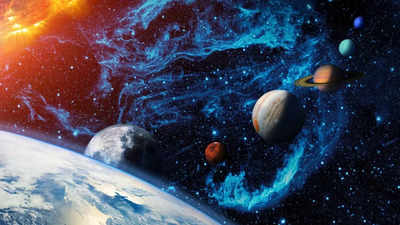The role of each planet in Astrology: How celestial bodies shape personality and life


In astrology, the planets do more than just orbit the Sun; each one holds a distinct influence over various aspects of our personality and life path. Astrologers believe that by examining the planets’ positions at the time of one’s birth, they can offer profound insights into strengths, challenges, relationships, and potential life lessons. Here’s an overview of each planet’s role in astrology and how they contribute to shaping who we are.
Sun: The Core of Personality and Identity
The Sun is the center of the astrological system, symbolizing one’s core identity, ego, and life purpose. It represents vitality, willpower, and how a person expresses their true self. Known as the ruler of Leo, the Sun highlights where an individual shines most and where they may naturally lead or express creativity.
Moon: Emotions and Inner Self
The Moon governs emotions, instincts, and how we experience comfort. It is a reflection of one’s inner world, revealing what makes us feel secure, nurtured, and connected to others. As the ruler of Cancer, the Moon is also linked to family, memory, and emotional intuition, guiding how we process feelings and respond to our surroundings.
Mercury: Communication and Intellect
Mercury influences communication, thought processes, and adaptability. Often associated with intelligence and quick thinking, Mercury determines how we express ourselves, make decisions, and engage in learning. As the ruler of Gemini and Virgo, it governs analytical thinking and the desire for information, making it essential in understanding our mental agility.
Venus: Love, Beauty, and Values
Venus represents love, relationships, beauty, and personal values. Often called the planet of harmony, Venus influences romantic inclinations, aesthetic preferences, and what we find pleasurable. As the ruler of Taurus and Libra, Venus speaks to our capacity for affection, our appreciation for beauty, and how we seek balance and connection in our lives.
Mars: Drive, Action, and Desire
Mars is the planet of drive, passion, and physical energy. It governs motivation, ambition, and how one pursues goals, particularly in matters of competition and conflict. Known as the ruler of Aries, Mars is associated with assertiveness, courage, and how we confront challenges. It speaks to one’s warrior spirit and how they take action.
Jupiter: Growth, Optimism, and Luck
Jupiter represents expansion, optimism, and spiritual growth. As the largest planet, Jupiter is seen as a magnifier of blessings and opportunities. It encourages exploration, philosophical thinking, and a love for adventure. Ruling Sagittarius, Jupiter is linked to higher learning, travel, and one’s quest for meaning and truth.
Saturn: Discipline, Responsibility, and Life Lessons
Saturn is often viewed as the teacher planet, representing structure, discipline, and life’s karmic lessons. It shapes resilience, self-control, and how we handle responsibility. As the ruler of Capricorn, Saturn often brings challenges that require patience and maturity, pushing individuals to grow through experience and perseverance.
Uranus: Innovation, Rebellion, and Change
Uranus is the planet of originality, revolution, and sudden change. Known for its unconventional influence, Uranus challenges norms and encourages progress and innovation. As the ruler of Aquarius, it fosters individuality and visionary thinking, often sparking breakthroughs and shifts in societal values.
Neptune: Imagination, Spirituality, and Illusion
Neptune governs dreams, intuition, and spirituality, often linked to creativity and compassion. It can also represent illusion, fantasy, and escapism. Ruling Pisces, Neptune influences one’s artistic talents, empathy, and subconscious desires, urging individuals to explore their connection to the spiritual realm and inner intuition.
Pluto: Transformation, Power, and Rebirth
Pluto symbolizes deep transformation, power, and the process of rebirth. Known for its intensity, Pluto represents endings and new beginnings, forcing individuals to confront their shadow side and find empowerment through change. As the ruler of Scorpio, Pluto influences themes of regeneration, personal strength, and the exploration of hidden truths.
The Role of the “Invisible” Planets
In astrology, the Sun and Moon are often regarded as “luminaries” rather than planets, yet they play essential roles alongside the other planets. The Moon, representing our emotional core, and the Sun, symbolizing our personal essence, work hand in hand with each planet’s unique energy to form a complete astrological picture.
How the Planets Interact
Planets don’t act in isolation; their positions and relationships to each other—known as aspects—can dramatically influence their effects. For example, a harmonious aspect between Venus and Jupiter might indicate a positive, expansive influence in love and personal values, while a challenging aspect between Mars and Saturn may highlight struggles with discipline or authority.
Whether you’re exploring astrology out of curiosity or seeking guidance, understanding each planet’s role offers a roadmap to self-discovery. In astrology, each planet’s unique influence helps paint a holistic picture, illuminating strengths, potential challenges, and the path to personal growth. As we look to the stars, we gain insight into ourselves and the universal patterns that connect us all.







